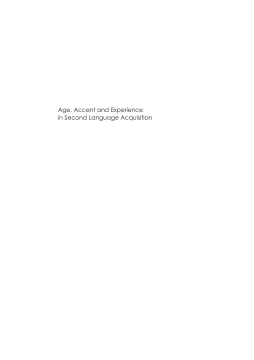
Additional Information
Book Details
Abstract
This work critically addresses the age debate in second language acquisition studies, presenting an in-depth study of factors that predict foreign accent. Quantitative and qualitative analyses confirm that cognitive, social, and psychological factors contribute to attainment, and that biological influences must therefore be considered alongside these essential aspects of learner experience.
Alene Moyer is Assistant Professor of Second Language Acquisition and Linguistics in the Germanic Studies department at the University of Maryland at College Park. Her research interests include theories of foreign and second language acquisition, critical period studies, and phonological acquisition, particularly from an interactionist perspective. In addition to teaching graduate and undergraduate courses in these areas, she conducts seminars in sociolinguistics and minority language maintenance in Germany. Her current research focuses primarily on advanced learners of a foreign/second language, highlighting the socio-psychological issues involved in classroom versus uninstructed acquisition.
This book is a must for students and researchers of age effects, especially for those interested in phonology, but it will also be of interest to researchers working on SLA and individual differences such as motivation, attitudes and identity issues.
Table of Contents
| Section Title | Page | Action | Price |
|---|---|---|---|
| Contents | v | ||
| Acknowledgments | vii | ||
| Chapter 1 Contextualizing Critical Period Inquiry | 1 | ||
| Chapter 2 Accounting for Universal and Individual Factors in Ultimate Attainment: Focus on Phonology | 14 | ||
| Chapter 3 Verifying the Relative Strength of Maturation, L2 Experience and Psychological Orientation: The Quantitative Findings | 50 | ||
| Chapter 4 Understanding Identity, Intention, and Opportunities for L2 Contact: The Qualitative Findings | 98 | ||
| Chapter 5 Conclusions and Proposals for Future Research | 138 | ||
| Appendix 1 Umfrage/Survey | 149 | ||
| Appendix 2 Linguistic Tasks | 152 | ||
| Appendix 3 Rater Survey | 154 | ||
| Appendix 4 Feedback Sheet | 155 | ||
| Appendix 5 Semi-Structured Participant Interview | 156 | ||
| References | 157 | ||
| Index | 175 |
